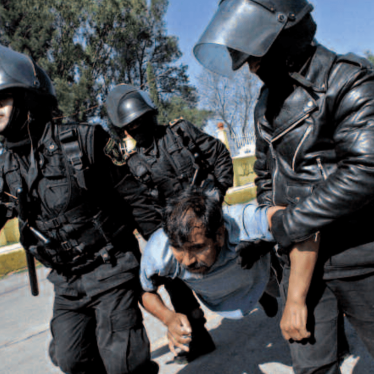Mexico’s National Human Rights Commission seriously limits its impact by not effectively promoting remedies and reforms needed to end abusive practices, Human Rights Watch said in a report released today.
The 128-page report, “Mexico’s National Human Rights Commission: A Critical Assessment,” examines the commission’s work on more than 40 human rights cases, including recent abuses by soldiers involved in law enforcement operations, police crackdowns against demonstrators in Guadalajara and San Salvador de Atenco, and the killings of women in Ciudad Juárez over the past decade, among others. The report also examines the commission’s role in addressing abusive laws, including restrictions on freedom of expression, and responding to important reforms, such as the Mexico City abortion law passed in 2007.
“The commission could have a much greater impact on human rights in Mexico, but it doesn’t,” said José Miguel Vivanco, Americas director at Human Rights Watch. “While it does a decent job documenting abuses and identifying problems, it doesn’t take crucial steps needed to bring about change.”
The mandate of the National Human Rights Commission (Comisión Nacional de Derechos Humanos, CNDH) is broadly defined to include both “protecting” and “promoting” human rights, and its legal powers provide ample tools to pursue this broad mission. Given the poor rights record of the country’s law enforcement agencies and the ineffectiveness of its justice system, the CNDH is often the only meaningful recourse available to victims seeking redress for abuses. It is also, potentially, the most important catalyst for the reforms needed to prevent future human rights violations.
The reason for the CNDH’s limited impact has been its own policies and practices. The CNDH has routinely failed to:
- press state institutions to hold accountable individuals responsible for abuses;
- promote legal reforms needed to prevent abuses;
- challenge abusive laws, policies, and practices that contradict international human rights standards;
- disclose and disseminate information it has collected on human rights problems with maximum transparency; and
- engage constructively with other state officials and rights advocates who are seeking to promote human rights progress in Mexico.
The CNDH’s limited impact is not due to a lack of resources, according to the report. With a budget in 2008 of US$79 million and more than 1,000 employees, the CNDH is by far the largest human rights institution of its kind in Latin America.
The report also identifies contributions that the CNDH has made in promoting human rights in Mexico over the years, including authoritative documentation of specific abuses and systemic obstacles to human rights progress.
“The CNDH should be a catalyst for human rights progress, not merely a chronicler of the status quo,” said Vivanco.
A Human Rights Watch delegation, led by Vivanco, presented the report this week to the CNDH and to Mexican government officials in the executive, legislative, and judicial branches. Human Rights Watch urged the CNDH and the Senate Human Rights Commission to adopt measures recommended in the report to ensure that the CNDH carry out its functions more effectively.








